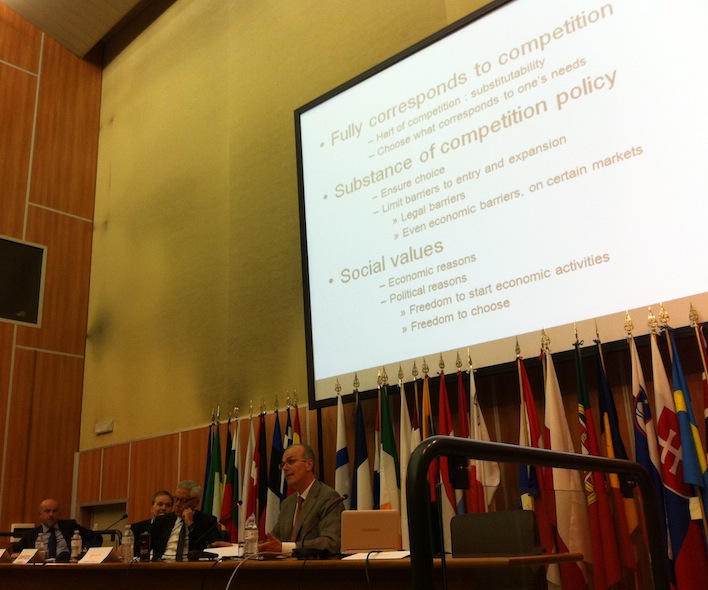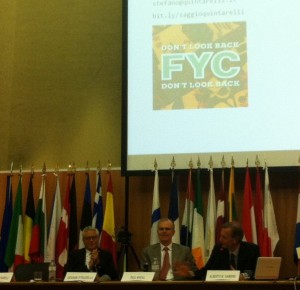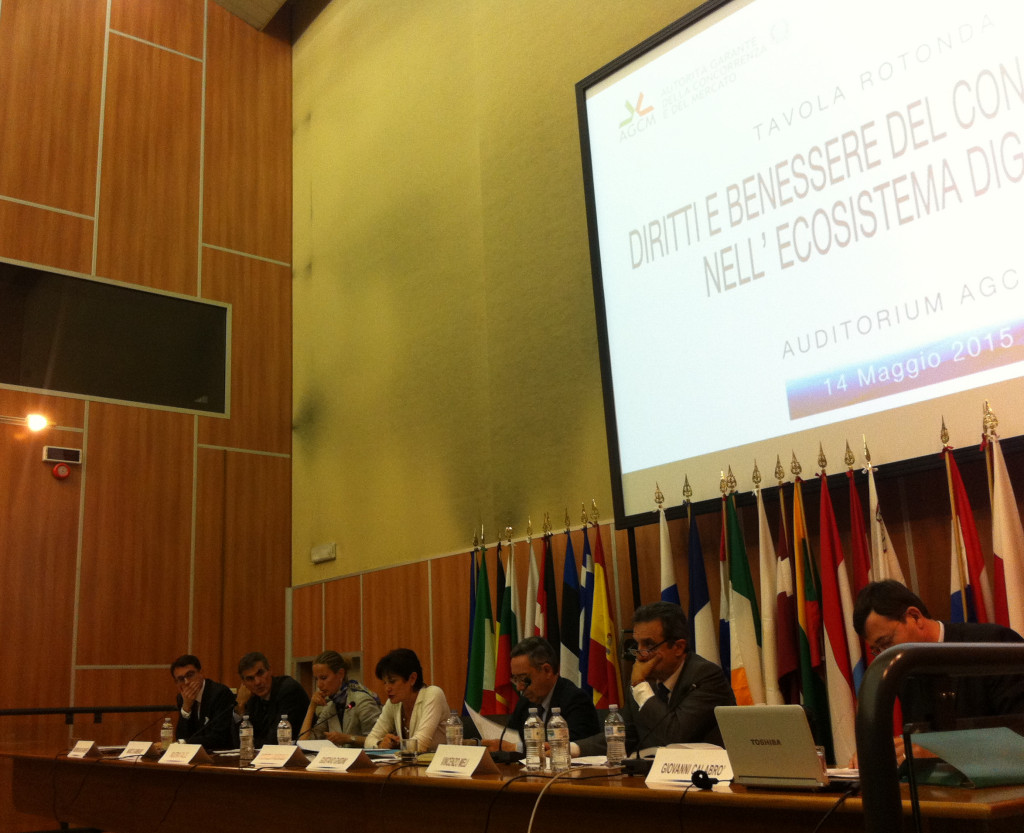The event, sponsored by the Authority and by the Italian Code of Internet, took place on May 14. They have participated in the work President John Pitruzzella Authority, the Hon. Stefano Quintarelli and several academics engaged in the analysis of the scene presented by the digital markets
“We have identified the environmental phenomena, new and complex, the Internet system, examined the existing rules and their enforcement , but above all we have tried to formulate proposals for future regulation and evolution of ‘ enforcement the same. ” That’s how Dr. Gabriella Muscle [ audio ], part of the Competition Authority and the market, closed the proceedings of “Rights and welfare consumer digital ecosystem “, an event that took place at the Auditorium AGCM in the afternoon of Thursday, May 14.
To promote the appointment the same Authority together with all ‘ Academy of the Italian Code of Internet on the occasion of the publication of the book “ The new consumer rights. Commentary to Decree. N. 21/2014 “ by Prof. Alberto Gambino and the lawyer. Gilberto Nava , as well as the launch of the third edition of the Master in Competition Law and Innovation organized by LUISS Guido Carli and by ‘European University of Rome .
Professor John Pitruzzella [ audio ] , President AGCM, opened the proceedings by stressing that “in the last period the Antitrust tends to establish a more and more frequent with the academy, with scholars and practitioners because we are talking about a law that requires a border evolution in constant relationship with the great transformations of the technology and economy that characterize this era. Consumer protection in the digital environment has some peculiarities not only regulations, but a challenge to the antitrust authority, the AGCM has collected in full opening and concluding cases of some importance at European level and in the field of consumer protection is on the protection of competition. On the first floor we moved as a forerunner, because the Italian authorities has tools enforcement probably the most refined than that enjoyed by others, but always in a partnership that provides for exchanges of information on a subject on which I believe the European Commission wants to invest. The second second side, we acted in close contact with the other authorities, in particular with the French and Swedish, to reach common decisions. “
Professor Gustavo Olivieri [ audio ] , Director of the Master, he later stressed the connection “between the issues addressed in the book and the agenda that has been recently published as a communication from the European Commission on Digital Single Market, which opens a real construction site will occupy the national systems for the coming years in several respects, including of course that of consumer protection. Among the topics reported in the agenda of the Commission’s fact, in paragraph 3.4, to build confidence in digital services and security thereof, in particular with regard to the processing of personal data. From this point of view it seems to me that one of the keys to understanding both of the recent innovations both in perspective can be precisely to strengthen the protection and confidence of consumers with access to network services. In this sense I believe that the data recently published by the communications to Italy should be eloquent and counter a worrying delay of our country. Suffice it to mention that Italians who use the Internet to make purchases are less than half the European average. “
” I do not think – he annotated Prof. Olivieri – enough only to strengthen the legal arsenal and protection for improve the framework, but it is certainly one of the elements on which we must work to bring the Italian consumer use of the Internet as a means of purchase and use of goods and services. Several points should be identified: a first theme is that of interference between this discipline and other areas that are affected and involved, and I think the field of payment services; A second area requiring coordination is the copyright on the network. Third, in general, we know that in recent months it is studying the implementation of the Directive on sitemi alternative dispute resolution; There are areas where we have already done something egregious, but certainly there is worldwide services and commercial products that in my opinion should be designed and coordinated to give greater efficiency and effectiveness in the protection of consumers with services dispute resolution that the state can not be said, in our country, sufficiently developed and which I believe the implementation of the Directive will help make more efficient “.
The session on Internet as a facilitator in the creation and sharing of goods and services was opened by Prof. Paul Nihoul [ audio ] (University of Louvain and President of Ascola ), which has traced a historical evolution of the media and the particularities introduced at various stages, ending on the tension between competition and coexistence “destructive” competition and “constructive”.

After him the Hon. Stefano Quintarelli [ audio ], deputy of Civic Choice and President of the Steering Committee of the Agency for Digital Italy, began by saying that “the issue is purely political. Unfortunately, in parliament, in Italy, in a thousand parliamentarians are only three computer; the net effect is that when discussing such things often do not understand the relevance. “
Quintarelli examined a scenario in which” those who once were enablers today They are new intermediaries “, describing the Internet as” the immaterial dimension of existence “and claiming that” bring together the word neutrality with search engine is an oxymoron. The search engine has to make choices, and the transparency of the algorithm is an impossibility. Even if a problem exists and we must take the tip to the brain to find the solution. “
 Professor Alberto Gambino [ audio ] , President of the Academy, has retraced the work that led to the commentary, before explaining: “The Academy is a sort of spin off of Prin The legal regulation of the Information and Communication Technologies (ICT) as a tool for strengthening of inclusive, innovative and secure , and is therefore a continuation of the study of these themes and content, to which aims to give a characterization more practical and pragmatic in a framework of dialogue with the institutions and the authorities. “
Professor Alberto Gambino [ audio ] , President of the Academy, has retraced the work that led to the commentary, before explaining: “The Academy is a sort of spin off of Prin The legal regulation of the Information and Communication Technologies (ICT) as a tool for strengthening of inclusive, innovative and secure , and is therefore a continuation of the study of these themes and content, to which aims to give a characterization more practical and pragmatic in a framework of dialogue with the institutions and the authorities. “
The discussion that followed was chaired and moderated by Dr. .ssa Muscle : “I first have to improve the knowledge of the high rate technology behind the new markets we are the ones enforcer . One key assumption is that between the market and the rights there is contradiction, but this digital market is special and inside open relevant issues “.

Professor Marco Gambaro [ audio ] of the University of Milan has intervened with a report entitled competitive dynamics in the network : “In the early days of the network, many economists argued that with the Internet, it’s easier to compare prices, the market would have been better and the competition would work more. At the same time, some strands of thought argued that some niches not exploited because of the transaction costs would be occupied. But the dispersion of prices is evident also in electronic markets and the long tail is not as effective as hoped. “
” It is not a new phenomenon, but the vertical dimension of competition has increased in the digital markets. No longer be used a static approach to the activity of promoting competition, the definition of the national markets only work partially. And the theme of the competition authorities to ensure that this becomes innovation game, where monopolies are undermined by other innovation, could develop in the right way. “
” On another front – continued Prof. . Gambaro – with digital markets consumers find themselves in a worse position than the traditional store; if in fact those who had acquired the ability to keep the money in one hand and the product in the other, paying downstream, now must pay before and hope the product arrivals, while brokers are far apart, communication with them often difficult and accept no responsibility for third-party platforms. I believe we must think about how to compensate for some asymmetries “.
Search neutrality and consumer welfare was the topic that focused Prof. Valeria Sickle [ audio ] European University of Rome: “There are two main changes introduced last month: on the one hand disputes notified on April 15 at Google , in which the Commission complains about the preference that the search engine would accord systematically linked to the results or in any way related to individuals with whom Google has commercial relations, whatever that is, an actual relevance of Google services with respect to the query entered by the user in the bar research; on the other hand, Communication of 6 May on the strategy to achieve the Digital Single Market, in which the Commission, in dwelling on the Second Pillar (create the right conditions for the development of digital networks and services), recognizes the historic changes occurred, the disruption of traditional business models, the driving role of competition and innovation. “
” As part of the antitrust proceeding, the Commission will clarify how the role of innovation in the digital economy, decline the competitive dynamics in the markets concerned, and hence whether the conduct of Google is based on an, aggressive but still legitimate, innovative initiative that is a strategy that interferes significantly on competition and innovation. As the Strategy on the digital market, the Commission will be convened to investigate the structural limitations and behavioral current architecture, and then propose solutions method and merit “.
” The challenge that promises you first policy. You will have to show his cards on delicate issues; for example, the neutrality of the engines is a goal to be pursued in the perspective of innovation, competition and consumer welfare? And if anything, the evidence would confirm the selectivity in the choices made by Google, the exercise of this option would in itself anti-competitive or a charge would express the innovativeness of service? More technically, the conduct qualify abusive in itself or should be ascertained a distorting effect? ”.
” As part of the larger mosaic designed by Digital Single Market Strategy for Europe , The Commission announced by 2015 a study on the role of the platforms, the weight of the shared economy and the contribution of online intermediaries in four different and intertwined perspectives: transparency in search results, use the information acquired; the opportunities and obstacles for consumers and businesses, in moving from one platform to another and the measures to be introduced to counter the sharing of illegal content on the Internet “.
” In the end – he concluded – It must decide how to ensure a harmonious development of the digital ecosystem. The choice will be to promote initiatives bottom up , and that is what is taking place in the field of standards, patents and cloud , leaving the market free to express themselves, only to intervene in If anti-competitive conduct, and that is what is happening with the case Google EU, or, finally, confirm the lack of confidence in the self-regulatory mechanisms of the market, and launch a regulatory process as a last resort “.
Prof. Massimiliano Granieri [ audio ] (University of Brescia) has focused its attention on Knowledge economy and evolution of markets , deepening the problems that emerged in connection with the Service Google News and the not always easy relationship with publishers in Europe: “First of all, we find ourselves asking whether it extended protection to proprietary new objects such as snippets ; Secondly, it is interesting that we are facing an unprecedented case of the relationship between intellectual property and competition. Usually the right holder was abusing its property to exclude a competitors , here would rather the holder to suffer abuse by a person who does not even know if it can be considered a competitor. Finally come into play fundamental rights as the right to information “.
” We must therefore ask first if you can argue a defense owner, with three perspectives; yes, no and maybe. The first entices publishers, Google the second, the third is a road that would lead substantially to recognize an exception to this type of aggregation of the news. Sure enough, in this case around Europe at the time he produced the damage, so as to bring Google to discontinue its service in Spain, and we must therefore ask whether consumers are better or worse. When the case landed in front of the AGCM, it returned the case to the legislature with the argument that it can not create a garrison owner “.
” It is clear – ended Professor Granieri – that there is a profile of contrast between technology and copyright, a contrast that generates equilibrium point that you create apparently with assistance from the legislator but which in reality are created from market movements, “indicating how the road to the regulator to accommodate the movements themselves and not groped to interfere with the natural dynamics of the market.
New forms of contractual and regulatory obligations has been the focus of Prof. Vincenzo Meli [ audio ] (University of Palermo): “On the one hand we have a scenario-art, on the other hand this scenario exacerbates old problems. Faced with this market immaterial and material problems have global, local and personal. In Europe we have gone from standards after all quite simple, standards increasingly complicated. The challenge is therefore the Authority of which categories and tools used to interpret these new rules. “
Dr. John Calabrò [ audio ] Director General for Environmental Protection of the Consumer in Agcm, retraced some of the recent interventions Authority chiosando that “today the consumer needs immediate protection. Certainly the AGCM can not give protection to the individual consumer, but it is also true that often emerge from individual reports real iceberg “.
And widening the view on Europe:” We have over 300 million Europeans who make transactions and only 15% of them can cross borders, since it makes us understand a lot about the barriers and difficulties still exist between Member States. On the one hand, therefore, there is the ambitious project of the Commission, is the need to strengthen confidence by strengthening safeguards. Finally it must be said that the Commission with the Directive consumer rights approximated systems that were in some cases very different disciplines and has launched a major campaign of educational . Because the idea is that the consumer has to be informed, not enough directives and enforcement . “
The last speech was that of Prof. Gustavo Ghidini [ audio 1 / audio 2 ] (LUISS Guido Carli), Co-Director of the Master, focused on a particular type of consumer, to financial products ” I think to a saver who has a modest preparation and on whose investment choices advertising can be a significant competitor and a source of influence “; examining some of the consumer protection as part of the purchase of “moveable consumer ordinary” Prof. Ghidini said that “you do not see the reason to deny protection corresponding to retail clients of brokers and distributors of issuers Financial because in this activity exposes the public to risk much higher than those of an appliance inefficient “.
” I would be happy – he said he hoped Dr. Muscle closing – to dedicate the magazine of Italian Antitrust a section on the results of this conference, that section would propose to name Do not look back. “
Related articles
Review of “The new consumer rights. Commentary to Decree. N. 21/2014 “
Article. 45 “Definitions”
Article. 52 “Return”
Article. 62 “Fees for the use of means of payment”
contracts online, assisted negotiation and telesales: new consumer rights in the conference in Rome. Attn AGCM
The video of the conference “The new consumer rights to the test of assisted negotiation. Legislative Decree. N. And Decree Law 21/2014 n. 132/2014 compared “
The competition has to deal with the digital
Net neutrality, Quintarelli:” You should be free to choose. At stake civil rights issues “
” A Digital Single Market for Europe “: the Commission sets out 16 initiatives to achieve it. It initiates an investigation Antitrust sull’eCommerce
Rc car, the Antitrust Authority accepts commitments and Facile.it 6sicuro
Rc car online, Antitrust and Ivass against mechanisms to opt out about offers do not like
Reservation, the Antitrust Authority accepts commitments Booking and closed the investigation. Expedia: “Ongoing constructive dialogue, we hope to reach a solution in the near future”
18 May 2015
No comments:
Post a Comment